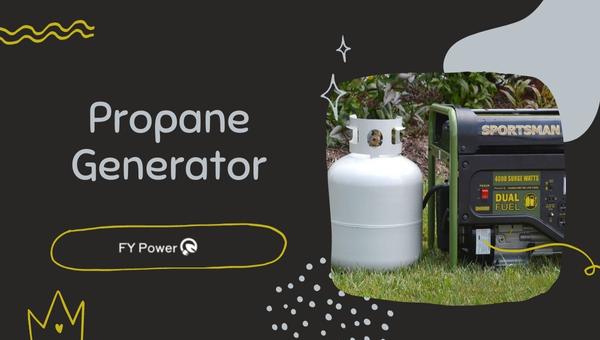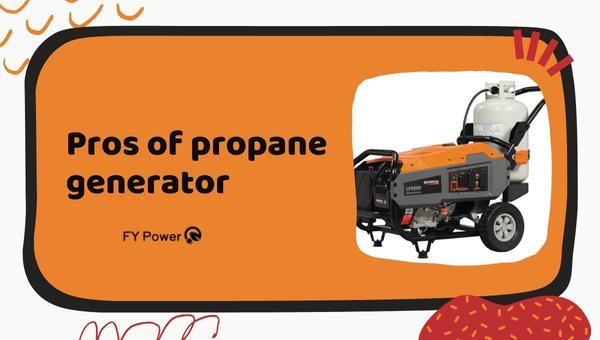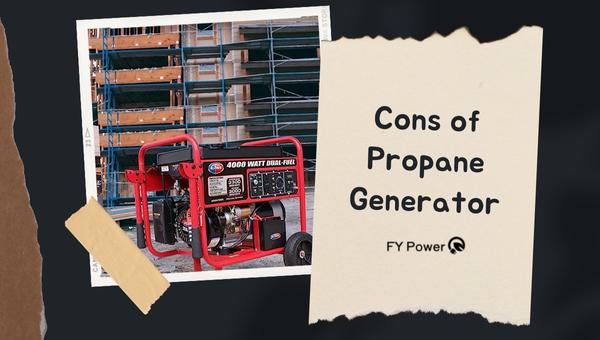Propane Vs Gas Generators are two of the most widely used fuel sources for powering a range of appliances, from home backup systems to industrial-sized power plants. If you’re confused between the two, here’s a quick overview of their advantages and disadvantages.
Each fuel has its own advantages and disadvantages, so it’s important to consider both before making a decision. Read on to learn more about these generators.
Propane Generator

Propane is a clean-burning fuel that is easy to store and transport. It produces fewer emissions than gasoline, making it an environmentally friendly choice. Additionally, propane generators tend to be quieter than their gasoline counterparts. On the downside, propane can be more expensive than gasoline and may require more maintenance over time.
Pros of propane generator

- Convenience – Propane generators are easy to start and require minimal maintenance. Additionally, propane is readily available and can be stored for long periods without degrading.
- Cost-Effective – Propane is typically 30-40% cheaper than other fuel types, making it an economical choice for powering your generator.
- Clean Burning – Propane produces fewer pollutants than gasoline or diesel, making it a more environmentally friendly option.
- Longer Shelf Life – Unlike gasoline, propane does not degrade over time, so you can store it for longer periods without worrying about losing its effectiveness as a fuel source.
- Dual Fuel Technology – Some propane generators can switch between propane and gasoline, giving you more flexibility in terms of fuel sources and allowing you to take advantage of the benefits of both fuels.
Cons of Propane Generator

- Expensive Upfront Cost – Propane generators tend to cost more upfront than other types of generators, such as gasoline or diesel. This can make it difficult to afford for some people.
- Produces Less Power – Propane generators typically produce less power than gasoline or diesel models, which means they may not be suitable for powering large appliances or multiple devices at once.
- Less Fuel Efficient – Propane is not as fuel efficient as other types of fuel, so it may require more frequent refills to keep the generator running.
- Requires Heavy Tanks – Propane tanks are heavier than other types of fuel tanks, which can make them difficult to transport and store when not in use.
- Fuel is Not Always Available – Depending on where you live, propane may not always be available for purchase, which could limit your ability to keep the generator running if you run out of fuel.
Gas Generator
Gasoline is the most common fuel used in portable generators. It’s relatively inexpensive compared to other fuels and readily available at most gas stations.
Gasoline also tends to have a longer shelf life than other fuels, meaning you won’t need to replace it as often. However, gasoline can produce more emissions than other fuels and may require more frequent maintenance due to its higher volatility.
Pros of Gas Generator
- Cost-Effective: Natural gas is typically less expensive than other fossil fuels, making it an economical choice for powering a generator.
- Efficient Operation: Natural gas generators are designed to run more efficiently than other types of generators, resulting in lower fuel consumption and fewer emissions.
- Environmentally Friendly: Natural gas produces fewer emissions than other types of generators, making it a more environmentally friendly option.
- Versatility: Gas generators can be used virtually anywhere and are suitable for both residential and commercial applications.
- Cleaner Fuel Source: Natural gas is one of the cleanest burning fossil fuels, meaning that natural gas generators produce fewer pollutants than other types of generators.
Cons of Gas Generator
- Explosive and Fire Hazard: Natural gas is highly explosive and can cause a fire hazard if the pipeline bursts.
- Unreliable Supply: Depending on your location, natural gas supply can be unreliable or expensive.
- Dangerous: Natural gas is extremely dangerous and needs to be handled with caution.
- Noise Pollution: Gas generators can be quite noisy, making them unsuitable for residential areas.
- Costly Maintenance: Gas generators require regular maintenance to keep them running properly.
Guide To Generac Generators Oil Types and Capacities (2023)
Similarities and Differences between Propane & Gas Generators
Propane and gas generators are both types of portable generators that can be used to provide power in the event of an outage. Both types of generators use fuel to generate electricity. However, there are some key differences between them. Here are some similarities and differences between the propane and gas generators.
Similarities
- Both propane and gas generators use fuel to generate electricity.
- They are both portable, making them easy to transport.
- Both types of generators have similar noise levels.
- They both require regular maintenance to ensure they run properly.
Differences
- Fuel Type: Propane generators use propane gas as their fuel source, while gas generators use gasoline or natural gas.
- Cost: Propane generators require a higher initial investment compared to gas generators, but their fuel cost is often lower.
- Power Output: Gas generators typically produce more power than propane generators, making them suitable for powering larger appliances or multiple devices at once.
- Fuel Efficiency: Propane generators are generally more fuel efficient than Gas generators, meaning they may require less frequent refills to stay running.
- Fuel Availability: Gasoline is widely available at most gas stations, while propane may not be available in all areas.
- Environmental Impact: Propane produces fewer emissions than gasoline, making it the more environmentally friendly option.
Conclusion
Both propane and gas generators can be used to power devices in the event of an outage. Propane generators require a higher initial investment but tend to be more fuel efficient and produce fewer emissions than gas generators.
Gasoline is widely available at most gas stations, making it easier to refuel when needed. Ultimately, the choice between a propane or gas generator will depend on the needs of your particular situation. We have provided you with the information you need to know about propane and gas generators, so you can make the best decision for your individual needs.

